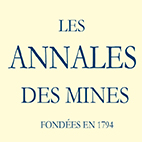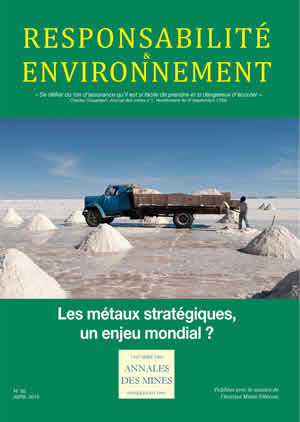|
 N° 82 - Avril 2016 - Les métaux stratégiques, un enjeu mondial ? N° 82 - Avril 2016 - Les métaux stratégiques, un enjeu mondial ?
Strategic metal recycling: adaptive metallurgical processing infrastructure and technology are essential for a Circular Economy
By Markus A. REUTER
Director Helmholtz Institute Freiberg for Resource Technology
and
Antoinette VAN SCHAIK
Director/owner/founder Material Recycling and Sustainability (MARAS) B.V.
Recycling forms the heart of the Circular Economy (CE) system. Ultimately all products will have to be recycled at their End-of-Life (EoL). Maximizing the recovery of materials and also especially strategic elements from EoL products requires a deep understanding of the fundamental limits and the dynamics of the evolving system, thus an adaptive processing and metallurgical infrastructure is critical to recover all metals and materials. Paramount is the quantification of the “mineralogy”, the complex and interlinked composition of products, to trace and quantify specifically all the losses of materials, metals, alloys, etc. due to thermodynamic and other non-linear interactions. We named this product centric recycling. The recycling potential and performance must be quantified and demonstrated for products, collection systems, waste separation and recovery technologies, and material supply. Emphasis is also placed on informing the consumer through iRE i.e. informing Resource Efficiency in an easy-to-understand way. System Integrated Metal Processing (SIMP) using big-data, multi-sensors, simulation models, metallurgy, etc. links all stakeholders through Circular Economy Engineering (CEE), an important enabler to maximize Resource Efficiency and thus iRE
 Télécharger gratuitement l'article Télécharger gratuitement l'article
 Retour au sommaire Retour au sommaire
 N° 82 - April 2016 - Strategic metals, the stakes worldwide? N° 82 - April 2016 - Strategic metals, the stakes worldwide?
Strategic metal recycling: adaptive metallurgical processing infrastructure and technology are essential for a Circular Economy
Markus A. Reuter,
Director Helmholtz Institute Freiberg for Resource Technology
and
Antoinette Van Schaik,
Director/owner/founder Material Recycling and Sustainability (MARAS) B.V.
Recycling forms the heart of the Circular Economy (CE) system. Ultimately all products will have to be recycled at their End-of-Life (EoL). Maximizing the recovery of materials and also especially strategic elements from EoL products requires a deep understanding of the fundamental limits and the dynamics of the evolving system, thus an adaptive processing and metallurgical infrastructure is critical to recover all metals and materials. Paramount is the quantification of the “mineralogy”, the complex and interlinked composition of products, to trace and quantify specifically all the losses of materials, metals, alloys, etc. due to thermodynamic and other non-linear interactions. We named this product centric recycling. The recycling potential and performance must be quantified and demonstrated for products, collection systems, waste separation and recovery technologies, and material supply. System Integrated Metal Processing (SIMP) using big-data, multi-sensors, simulation models, metallurgy, etc. links all stakeholders through Circular Economy Engineering, an important enabler to maximize Resource Efficiency.
 Retour au sommaire Retour au sommaire
 N° 82 - April 2016 - Die strategischen Metalle, eine globale Herausforderung ? N° 82 - April 2016 - Die strategischen Metalle, eine globale Herausforderung ?
Strategic metal recycling : adaptive metallurgical processing infrastructure and technology are essential for a Circular Economy
Markus A. Reuter,
Director Helmholtz Institute Freiberg for Resource Technology
and
Antoinette Van Schaik,
Director/owner/founder Material Recycling and Sustainability (MARAS) B.V.
Recycling forms the heart of the Circular Economy (CE) system. Ultimately all products will have to be recycled at their End-of-Life (EoL). Maximizing the recovery of materials and also especially strategic elements from EoL products requires a deep understanding of the fundamental limits and the dynamics of the evolving system, thus an adaptive processing and metallurgical infrastructure is critical to recover all metals and materials. Paramount is the quantification of the “mineralogy”, the complex and interlinked composition of products, to trace and quantify specifically all the losses of materials, metals, alloys, etc. due to thermodynamic and other non-linear interactions. We named this product centric recycling. The recycling potential and performance must be quantified and demonstrated for products, collection systems, waste separation and recovery technologies, and material supply. System Integrated Metal Processing (SIMP) using big-data, multi-sensors, simulation models, metallurgy, etc. links all stakeholders through Circular Economy Engineering, an important enabler to maximize Resource Efficiency.
 Retour au sommaire Retour au sommaire
 N° 82 - Abril 2016 - Los metales estratégicos, ¿un desafío mundial? N° 82 - Abril 2016 - Los metales estratégicos, ¿un desafío mundial?
Strategic metal recycling: adaptive metallurgical processing infrastructure and technology are essential for a Circular Economy
Markus A. Reuter,
Director Helmholtz Institute Freiberg for Resource Technology
and
Antoinette Van Schaik,
Director/owner/founder Material Recycling and Sustainability (MARAS) B.V.
Recycling forms the heart of the Circular Economy (CE) system. Ultimately all products will have to be recycled at their End-of-Life (EoL). Maximizing the recovery of materials and also especially strategic elements from EoL products requires a deep understanding of the fundamental limits and the dynamics of the evolving system, thus an adaptive processing and metallurgical infrastructure is critical to recover all metals and materials. Paramount is the quantification of the “mineralogy”, the complex and interlinked composition of products, to trace and quantify specifically all the losses of materials, metals, alloys, etc. due to thermodynamic and other non-linear interactions. We named this product centric recycling. The recycling potential and performance must be quantified and demonstrated for products, collection systems, waste separation and recovery technologies, and material supply. System Integrated Metal Processing (SIMP) using big-data, multi-sensors, simulation models, metallurgy, etc. links all stakeholders through Circular Economy Engineering, an important enabler to maximize Resource Efficiency.
 Retour au sommaire Retour au sommaire
|




